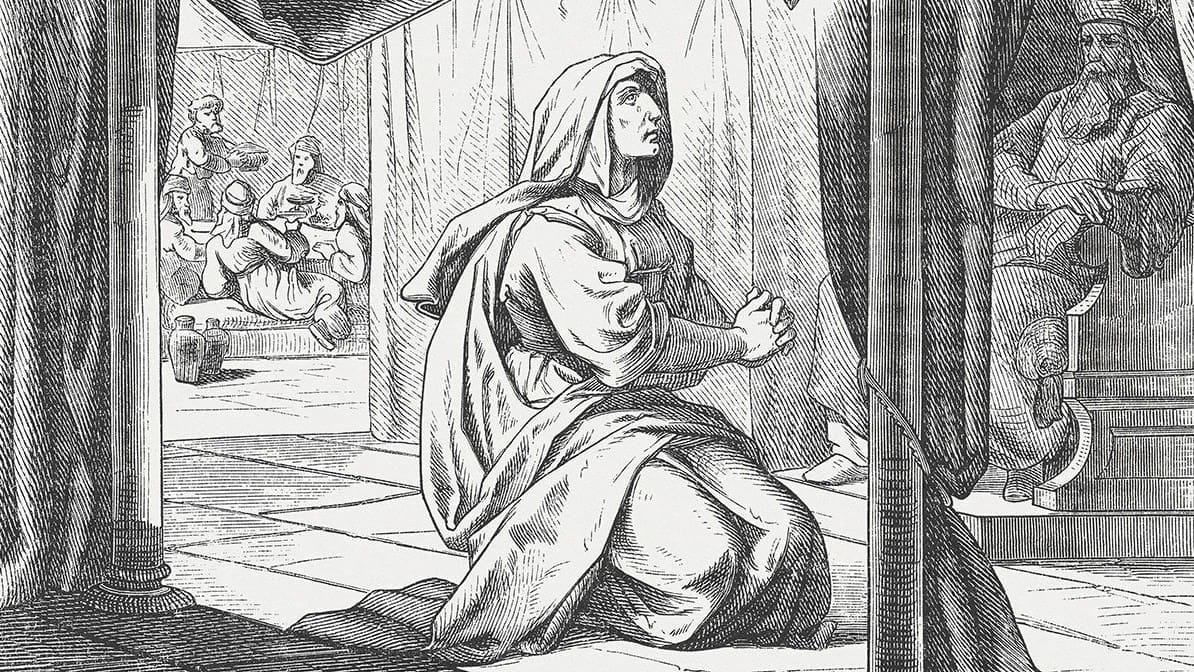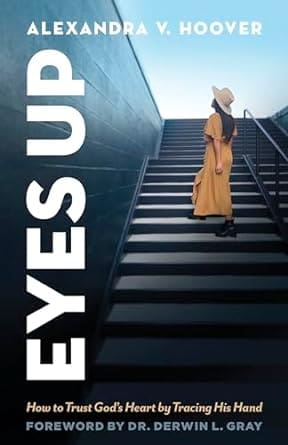- Home
- Spiritual Life
- The God Who Remembers

The God Who Remembers
The God Who Remembers
The book of 1 Samuel in the Bible holds a story that has always grabbed my attention. It takes place during a transition period—between the time the people of God were led by judges and the time they were led by kings. They didn’t know they’d need a prophet to help guide this transition, but God knew.
But the book doesn’t start with the prophet God provides for them. Instead, the book starts by introducing us to one of my favorite Bible friends, Hannah. She’s a praying woman. A woman who dedicated her life to God. She followed Him, sought Him, and loved Him. From what we read about her, she lived a life of gratitude. She was known for her commitment and conviction even while her prayers seemed to remain unanswered. She also lived a life of affliction and pain, showing us all what it looks like to hold space for the tension of both grief and wild hope. Isn’t that something? That hope in God can coexist with the pain brought on by our circumstances? Even in her fallenness, Hannah felt both and carried both. But ultimately she let one lead her.

Hannah was one of Elkahan’s wives. Did you say one of multiple wives, Alex? I know. Stay with me. We’re talking about a certain time period and cultural context in the Old Testament, thousands of years ago, when it was common for men to have more than one wife. We could camp out there for a while and explore some things, but for the sake of time, let’s hear how Hannah’s story plays out.
Peninnah, Elkahan’s other wife, had children. Our friend Hannah had been unable to conceive for years. The pain that followed her was often unbearable, so much so that the priest Eli assumed she was drunk from the utter brokenness and weeping and wailing that she brought to the Lord at the temple (1 Sam. 1:10, 12–14).
In a culture that prized having kids as the primary badge of honor for women, Hannah was shamed for not being able to bear children; she was looked down on and, most likely, even talked about as gossip spread through town about her condition. Scripture says her “rival,” the other wife, even taunted her, making fun of her inability to bring little ones into the world (1 Sam. 1:5-7). Can you hear the whispers around town? Still no kids? Goodness, God must be cursing her. I wonder what she did to make Him mad. I wonder what’s wrong with her.
As I think about her story, I can relate. Hannah was faithful yet overlooked. She showed up and gave all that she had, yet life handed her a different set of cards. She was committed and wanted nothing more than to give God the glory. Yet there she was—childless, alone, and accused.
When we feel like God overlooks us, it leaves us wondering if His kindness was ever ours to have. “This isn’t fair. Does He choose favorites? Am I doing this wrong, the faith? Maybe I’m just not believing enough.”
Scripture tells us that Hannah was weeping, heartbroken over the circumstance she found herself in (1 Sam. 1:7, 10). I have uttered prayers like that before. Prayers that only the Father can understand. Prayers so deep and personal that they were more like groans than actual words. Groans that communicate the ache and depth of my petitions, my agony. Words that can only be unpacked and unraveled by Him. I want to go back and tell Hannah that I understand her. That I, too, have felt forgotten and overlooked. Why on earth does it seem that the goodness of God picks favorites? Why does Peninnah draw an Ace every time while we Hannahs of the world always get dealt a bad hand?
In the eyes of her culture and even her priest, Hannah was a lost cause, a forgotten face in a sea of other women whose lives were full of blessing. She was invisible to everyone around her. Everyone except God. Scripture tells us that God remembered her (1 Sam. 1:19). He’d heard her. He’d seen her.
I’d be silly not to stop there and let that settle into our souls. I remember the first time I read the story, those words struck a heartstring, a chord. For some reason, the fact that God had met Hannah in such a personal way absolutely overwhelmed me. “The Lord remembered her.”
Gosh, I thought. I want to be remembered. I want to remember hope and joy. I want to know this hope and joy that meet us when we’re remembered by someone, by God.
Do I get to be remembered?
God, why don’t I feel remembered?
Why do I feel the complete opposite?
Why do I feel like You’ve forgotten me?
And then I retraced Hannah’s steps. What did she do when she felt forgotten?
Deeply hurt, Hannah prayed to the Lord and wept with many tears. Making a vow, she pleaded, “Lord of Armies, if you will take notice of your servant’s affliction, remember and not forget me, and give your servant a son, I will give him to the Lord all the days of his life, and his hair will never be cut.” (1 Sam. 1:10–11)
I felt Hannah’s ache right along with her. But you know what? I felt her hope, too, in the undercurrent of her prayer. Her faith became mine. She let me borrow some of it. She helped me go to God in my pain. She helped me show up to His presence with all my agony and reach out for His fatherly compassion. God helps us along that way, doesn’t He? In stories like Hannah’s, He helps us see those around us press on, and it gives us the hope to keep going.
We are not forgotten. You are not forgotten. God’s kindness and faithfulness make a way for us to experience life and love. We don’t serve a forgetful God but a faithful God. One who sees and hears and remembers us. What may look like His inactivity will almost always be our inability to see His activity—to see His grace, His heart, His hand at work. This is why our gaze matters so much. What we set our eyes on becomes our source of hope and direction. Hannah knew where to look, not to the naysayers or the crumbling circumstances but at Him.
What did a lifted gaze look like for her? It looked like her resolve to keep going back to the temple even when God’s activity and ability to move seemed absent. She remembered who God was over what her circumstances told her. This temple was a visible reminder that God was with her. Day after day, she kept her eyes fixed on it; she kept going back in remembrance of the goodness of God. She kept showing up, knowing that God was in that room somehow, and that somehow, someway, He’d meet her here and help her. People don’t pray to the point that Hannah did unless they believe that. And this hope carried her to the next day.
See, Hannah let God’s character carve the guardrails of her faith. He was good, and He was good to her—in the midst of the pain and even when it didn’t feel like He was. Hannah’s hope in God’s heart carried her when she couldn’t see God’s hand. It was His heart that she had resolved herself in, not her circumstances.
That right there is its own miracle.
But then something beautiful happens: Hannah gives birth to a son named Samuel and immediately dedicates Him to the Lord—meaning, she gives Samuel to the current priest (Eli) so that he would join the priesthood (1 Sam. 1: 20–28). And what’s the priesthood, you ask? A people set apart from the rest of the Israelites to mediate between them and God. The son that Hannah so desperately prayed for was to be a conduit of hope and deliverance for so many of the Israelites. Her pain had produced deep perseverance for us all to glean from and a purpose for all to prosper from—for our good and His glory. As the temple reminded her of God’s kindness and help, now here is a son, another reminder. A living reminder. God is here, and He is good. For Hannah, God answered her prayer and gave her a son, Samuel. For us, our greatest gift and reminder that the Lord is for us and with us is a son, too—the Son of God. Jesus. We were in agony, in darkness, in accusation, in shame, just like Hannah. And just like Hannah, God remembered us in that place, and sent down a Son who could change things.
…
Excerpt taken from Chapter 1 “The Starting Stone: Where Were You, God?” from Eyes Up: How to Trust God’s Heart by Tracing His Hand by Alexandra V. Hoover
Order your copy of Eyes Up: How to Trust God’s Heart by Tracing His Hand by Alexandra V. Hoover
Trending Now
Sign up today for your Inspiration Today Daily Newsletter
Supercharge your faith and ignite your spirit. Find hope in God’s word. Receive your Inspiration Today newsletter now!
Alexandra V. Hoover
Alexandra V. Hoover is a wife, mother of three, daughter, sought-out speaker, and writer. She’s passionate about communicating the gospel’s beauty and hope, whether through writing or speaking, online or in person. Her words spur people on to hope, healing, and their mission. She has the privilege of serving on staff at Transformation Church and spends her days loving on her family, dancing with her kids, and living on mission right where God has her. Learn more at alexandravhoover.com
Related Articles
February 23, 2026
The Joy of Being His Workmanship
When life urges us to strive harder and do more, Scripture invites us to rest in a freeing truth:…
February 20, 2026
Stepping Out in Faith When God Calls You to the Impossible
Stepping out in faith often feels uncomfortable—especially when God calls you toward something that…
February 20, 2026
Finding Joy Is a Choice—Even When Life Is Hard
Sorrow doesn’t pause life—and neither does joy. If you’ve ever wondered how to find joy in…
February 19, 2026
The Secret to Supernatural Joy in Your Life
What if joy wasn’t tied to circumstances at all? Supernatural joy—the kind Jesus promised—can…
Next Steps To Strengthen Your Walk
Inspiration Today Newsletter
Supercharge your faith and ignite your spirit. Find hope in God’s word. Receive your Inspiration Today newsletter now!
Christian Articles
Find articles to strengthen your walk and grow your faith. We have a wide range of topics and authors for you.
Submit A Prayer Request
We are here for you. Simply click on the button below to reach us by form, email or phone. Together we will lift our hearts and voices with you in prayer.





